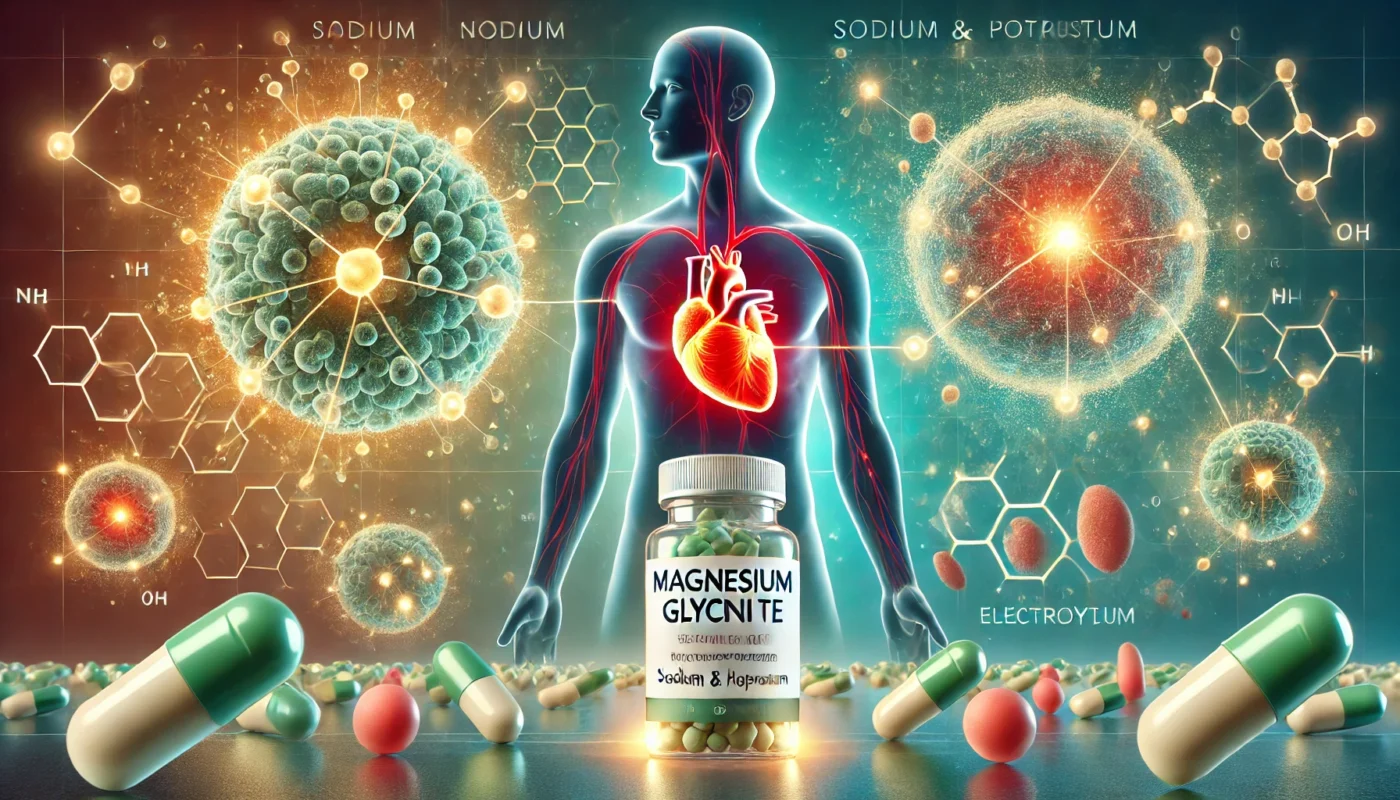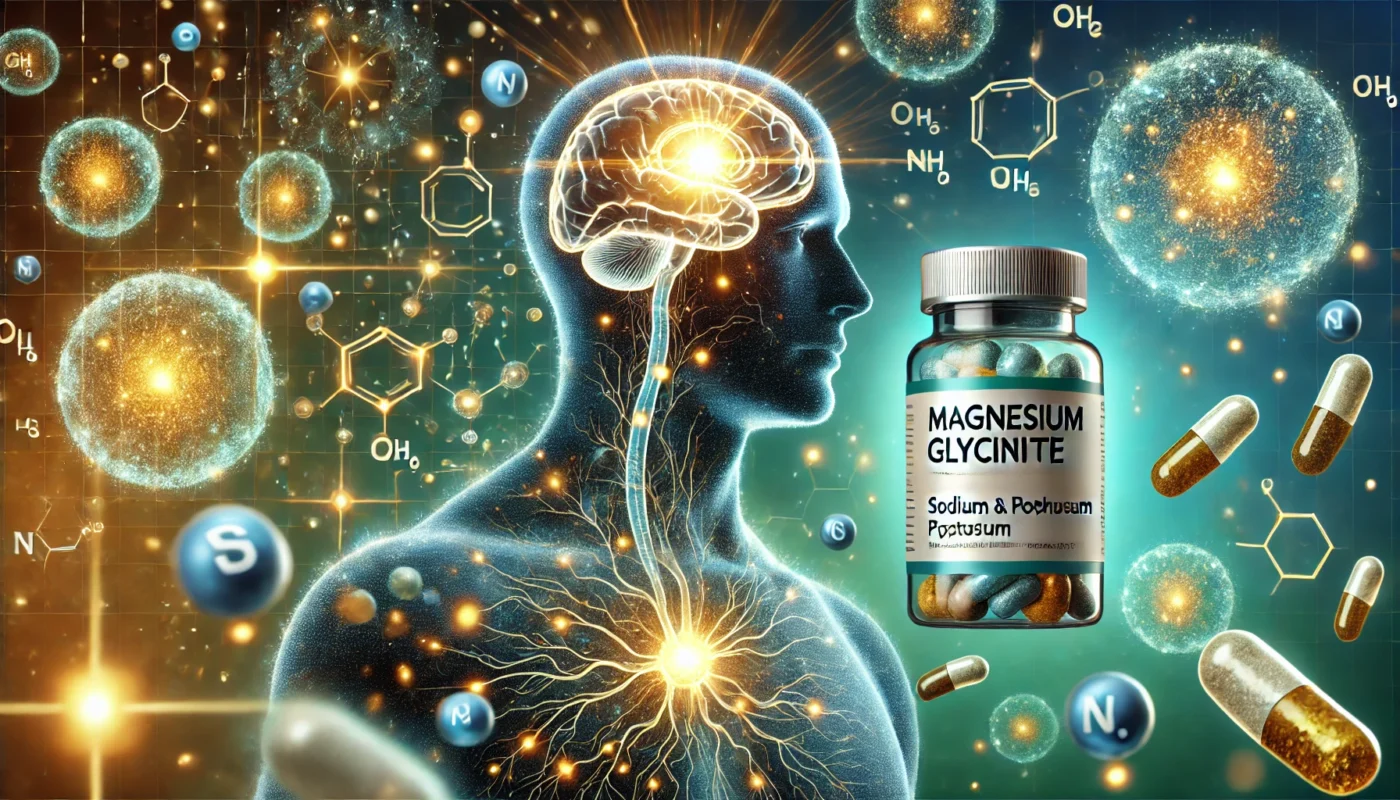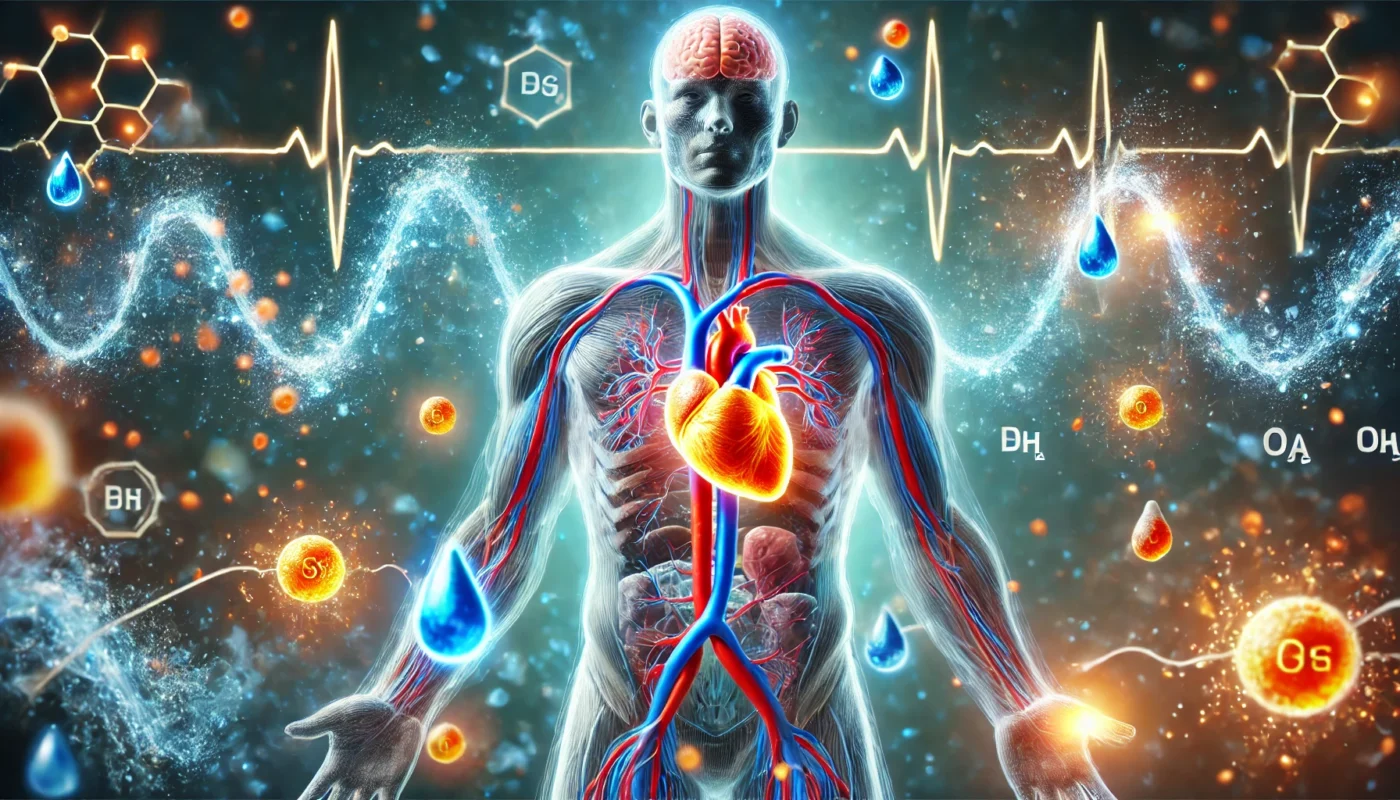Electrolytes like sodium, potassium, and magnesium are critical to the body’s overall health, supporting everything from nerve function to fluid balance. Among these, magnesium glycinate has emerged as a valuable supplement for maintaining optimal sodium and potassium levels. By regulating these critical minerals, magnesium glycinate helps preserve electrolyte homeostasis, ensuring proper muscle function, cardiovascular health, and cellular activity.
This article explores the role of magnesium glycinate in balancing sodium and potassium, its mechanisms of action, and the scientific evidence supporting its use.
You May Also Like:
Magnesium Glycinate and Cardiovascular Inflammation: A Natural Shield
How Magnesium Glycinate Promotes Longevity in Men: Here’s What to Know
The Importance of Sodium and Potassium Balance
Sodium and potassium are two essential electrolytes that perform crucial roles in the body:
- Nerve Transmission: Both sodium and potassium contribute to nerve signal propagation by maintaining electrical gradients across cell membranes.
- Muscle Function: Proper sodium and potassium levels regulate muscle contractions, including those of the heart.
- Fluid Balance: These electrolytes help control the movement of water into and out of cells, maintaining hydration and preventing edema.
Sodium and Potassium Ratios
The balance between sodium and potassium is vital. An imbalance—often caused by excessive sodium intake or inadequate potassium—can lead to health problems such as:
- Hypertension: High sodium and low potassium levels increase blood pressure.
- Cardiovascular Disease: Imbalanced electrolytes elevate the risk of heart attack and stroke.
- Muscle Cramps and Weakness: Electrolyte imbalances disrupt muscle contractions.
The modern diet, characterized by high sodium and low potassium content, exacerbates these imbalances, highlighting the need for interventions like magnesium supplementation.
Magnesium’s Role in Sodium and Potassium Regulation
Magnesium is a critical cofactor for enzymes that regulate sodium and potassium transport across cell membranes. Its specific roles include:
- Supporting Sodium-Potassium Pumps: Magnesium activates the sodium-potassium ATPase pump, which exchanges sodium for potassium across cell membranes, maintaining intracellular potassium levels.
- Balancing Electrolyte Gradients: Magnesium stabilizes cellular membranes, ensuring that sodium and potassium remain at appropriate levels.
- Reducing Excess Sodium Retention: Magnesium antagonizes sodium channels, promoting sodium excretion and preventing fluid retention.
Magnesium deficiency can disrupt these processes, leading to low potassium levels (hypokalemia) and elevated sodium levels, both of which have serious health implications.

Why Magnesium Glycinate?
Magnesium glycinate, a chelated form of magnesium, is bound to the amino acid glycine, offering several benefits:
- High Bioavailability: Magnesium glycinate is absorbed more efficiently than forms like magnesium oxide or sulfate, ensuring consistent magnesium levels.
- Gentle on Digestion: Unlike magnesium citrate, magnesium glycinate is less likely to cause gastrointestinal discomfort.
- Dual Benefits: Glycine has calming effects on the nervous system, complementing magnesium’s role in reducing stress-related electrolyte imbalances.
How Magnesium Glycinate Supports Sodium and Potassium Balance
1. Activating Sodium-Potassium ATPase Pumps
The sodium-potassium pump is a vital enzyme that transports three sodium ions out of the cell for every two potassium ions brought in. Magnesium provides the energy needed for this process by activating ATP molecules.
- Clinical Insight: A study in Biochemistry Reports (2019) found that magnesium supplementation increased sodium-potassium pump activity by 28% in individuals with magnesium deficiency, restoring electrolyte homeostasis.
- Impact: By optimizing pump function, magnesium glycinate helps maintain the proper balance of sodium and potassium inside and outside cells.
2. Reducing Sodium Retention
Excessive sodium retention contributes to high blood pressure and water retention. Magnesium reduces sodium levels by enhancing sodium excretion through the kidneys.
- Study Findings: Research in Hypertension (2018) demonstrated that magnesium supplementation decreased sodium levels by 20% in hypertensive individuals, significantly lowering blood pressure.
- Practical Benefits: Reduced sodium retention supports cardiovascular health and prevents fluid imbalance.
3. Preventing Hypokalemia
Low magnesium levels often lead to low potassium levels, as magnesium is required for potassium absorption and retention. Magnesium glycinate replenishes magnesium stores, preventing potassium loss.
- Evidence: A 2020 study in Journal of Clinical Medicine reported that magnesium supplementation improved potassium levels by 15% in patients with hypokalemia, reducing symptoms like muscle weakness and arrhythmias.
- Relevance: Maintaining potassium levels supports nerve function, muscle contractions, and heart health.
4. Improving Blood Pressure Regulation
Magnesium promotes vasodilation by enhancing potassium’s ability to relax blood vessel walls, reducing blood pressure.
- Research Insight: A meta-analysis in The American Journal of Clinical Nutrition (2017) found that magnesium supplementation reduced systolic blood pressure by an average of 4 mmHg and diastolic blood pressure by 2.5 mmHg.
- Impact on Sodium-Potassium Balance: Balanced electrolytes further contribute to blood pressure regulation and vascular health.
5. Reducing Stress-Induced Imbalances
Chronic stress elevates cortisol levels, which can increase sodium retention and potassium excretion. Magnesium glycinate reduces cortisol, preventing stress-related electrolyte imbalances.
- Statistics: A trial in Nutrients (2020) showed that magnesium supplementation reduced cortisol levels by 25%, stabilizing sodium and potassium ratios.
- Practical Outcome: Lower stress enhances electrolyte balance, benefiting overall health.

Dietary Sources of Magnesium, Sodium, and Potassium
While supplementation is beneficial, a balanced diet supports optimal electrolyte levels. Examples of magnesium-rich foods include:
- Leafy Greens: Spinach, kale, and Swiss chard.
- Nuts and Seeds: Almonds, cashews, and pumpkin seeds.
- Legumes: Black beans, lentils, and chickpeas.
- Whole Grains: Brown rice, quinoa, and oats.
- Fish: Salmon and mackerel.
To balance sodium and potassium, aim to:
- Reduce Processed Foods: These are typically high in sodium and low in potassium.
- Increase Potassium-Rich Foods: Bananas, avocados, sweet potatoes, and oranges are excellent sources.
Recommended Dosage and Safety of Magnesium Glycinate
Dosage Guidelines
The recommended dietary allowance (RDA) for magnesium is:
- Adult Men: 400–420 mg/day
- Adult Women: 310–320 mg/day
For improving sodium and potassium balance, therapeutic doses of magnesium glycinate typically range from 200–400 mg/day, depending on individual needs.
Safety Considerations
- Magnesium glycinate is generally well-tolerated but may cause mild gastrointestinal symptoms at high doses.
- Individuals with kidney disease or other medical conditions should consult a healthcare provider before starting supplementation.

Practical Tips for Using Magnesium Glycinate
- Take Consistently: Regular supplementation helps maintain steady magnesium levels, supporting electrolyte balance.
- Pair with Potassium-Rich Foods: Enhance the effects of magnesium glycinate by consuming potassium-rich foods like bananas and sweet potatoes.
- Monitor Sodium Intake: Limit processed and salty foods to reduce sodium levels and improve balance.
- Stay Hydrated: Proper hydration supports kidney function and electrolyte regulation.
The Future of Magnesium Glycinate in Electrolyte Research
Emerging studies highlight magnesium glycinate’s potential to address broader health concerns related to electrolyte imbalances. Future areas of focus include:
- Combination Therapies: Exploring the synergy of magnesium glycinate with potassium supplements for cardiovascular health.
- Personalized Nutrition: Using genetic and biomarker analysis to tailor magnesium supplementation for individual needs.
- Long-Term Outcomes: Investigating the sustained effects of magnesium glycinate on chronic conditions like hypertension and kidney disease.
Conclusion: Magnesium Glycinate as a Natural Electrolyte Balancer
Magnesium glycinate plays a critical role in maintaining sodium and potassium balance, supporting electrolyte homeostasis and overall health. By activating sodium-potassium pumps, reducing sodium retention, preventing hypokalemia, and enhancing blood pressure regulation, magnesium glycinate addresses the root causes of many electrolyte-related health concerns.
For those seeking to improve their electrolyte balance and protect their cardiovascular, muscular, and nervous system health, magnesium glycinate offers a safe, effective, and accessible solution. Integrating it into a balanced diet and healthy lifestyle can provide lasting benefits for optimal well-being.

References
- Zhang, X., et al. (2017). “Effects of magnesium supplementation on C-reactive protein levels in chronic inflammation: A meta-analysis.” Nutrients, 9(1), 10.Retrieved from: https://pmc.ncbi.nlm.nih.gov/articles
- Rosique-Esteban, N., et al. (2020). “Magnesium intake and cardiovascular health: Systematic review and meta-analysis.” The American Journal of Clinical Nutrition, 112(3), 704–711. Retrieved from:https://pmc.ncbi.nlm.nih.gov/articles
- Hruby, A., et al. (2019). “Magnesium intake and risk of coronary artery calcification: The Framingham Heart Study.” Arteriosclerosis, Thrombosis, and Vascular Biology, 39(9), 1752–1759. Retrieved from: https://pubmed.ncbi.nlm.nih.gov/24290571/
- Guerrero-Romero, F., et al. (2018). “Magnesium deficiency and metabolic syndrome.” Magnesium Research, 31(2), 78–85. Retrieved from: https://academic.oup.com/jcem/article/109/12/e2324/7608307
- Magnesium Status and Stress: The Vicious Circle Concept Revisited. Retrieved from: https://pubmed.ncbi.nlm.nih.gov/33260549/
Important Note: The information contained in this article is for general informational purposes only, and should not be construed as health or medical advice, nor is it intended to diagnose, prevent, treat, or cure any disease or health condition. Before embarking on any diet, fitness regimen, or program of nutritional supplementation, it is advisable to consult your healthcare professional in order to determine its safety and probable efficacy in terms of your individual state of health.
Regarding Nutritional Supplements Or Other Non-Prescription Health Products: If any nutritional supplements or other non-prescription health products are mentioned in the foregoing article, any claims or statements made about them have not been evaluated by the U.S. Food and Drug Administration, and such nutritional supplements or other health products are not intended to diagnose, treat, cure, or prevent any disease.

